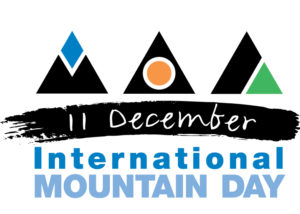The United Nations has declared December 11 each year as International Mountain Day. Celebrated since 2003, International Mountain Day recognizes the critical importance of mountain ecosystems for assuring the sustainability of the earth.

Mountains comprise about a quarter of the earth’s land surface outside Antarctica and are home to about 13% of the earth’s human population. Mountains are much more important than those percentages, however, as they influence the resources upon which most of the earth’s ecosystems depend. Mountains affect weather systems, creating both wet and dry ecosystems in their shadows. Mountains are the source of 60-80% of the world’s surface supply of freshwater, which is cycled continuously due to the role of mountains in hydrologic processes.
Mountains are also the home for major sources of renewable energy. Hydropower, which supplies about 20% of all electricity today, originates largely in mountains, where high-gradient streams are dammed to capture the kinetic energy of falling water. High winds that often accompany mountains are reliable sources of wind energy. Mountains in dry tropical areas are also often major sites for solar power development.
Biodiversity is exceptionally high in mountain regions. The compression of different habitat types as elevation changes means that many kindss of ecosystems are represented in a small geographic region and that pockets of unique habitats exist where special combinations of temperature, moisture, landform and exposure occur. About 25 % of the earth’s total biodiversity occurs in mountains—but 50% of biodiversity hotspots occur there. The alpine region, above the tree line, is especially diverse in unique plant species.
The vast majority (90%) of humans inhabiting mountainous regions live in developing countries. Most live in poverty, occasioned by the isolation and low productivity of mountain ecosystems. The local communities in mountain regions have evolved unique ways of life based on their native understanding of the local ecology, finding ways to grow food and produce exportable crops—coffee, honey, herbs, spices, dyes, medicine, cosmetics and handicrafts—to support their families.
The UN Food and Agriculture Organization takes responsibility for organizing and promoting International Mountain Day. A new theme is selected annually. The 2017 theme is “Mountains under Pressure: climate, hunger, migration.” The theme recognizes that mountain ecosystems—and, consequently, mountain peoples—are highly vulnerable to climate change, climate variability, and climate-related disasters. FAO is using the theme as the centerpiece for a global meeting on mountains in December, 2017, with the goal of generating a new approach to mountain sustainability.
References:
Food and Agriculture Organization of the United Nations. 2017. International Mountain Day. Available at : http://www.fao.org/international-mountain-day/key-messages/en/. Accessed December 12, 2017.
Spehn, Eva M., et al. 2010. Mountain Biodiversity and global change. Institute of Botany, University of Basel, Basel, Switzerland. Available at: http://www.fao.org/docrep/017/i2868e/i2868e00.pdf. Accessed December 12, 2017.
